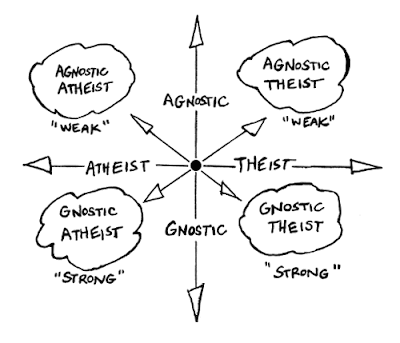In a discussion over at Bud's blog Dead Logic, a reader asked a question I have been hearing more and more recently. It's a good question, so I thought I would do my part to try and answer it.
Doesn't admitting to being an agnostic instead of an atheist FEEL like you're being wishy-washy, or not fully committing to your "belief"? ... I understand that it's only honest to say that we CAN'T be sure, but I sure do hate to show weakness (real or perceived) in an argument.
Not at all.
- Agnosticism deals with knowledge.
- Atheism deals with belief.
The Agnostic position cannot assume whether a thing like a God could exist or not given the lack of sheer evidence for such a things existence. Therefore knowing with any given certainty just isn't possible. The agnostic then makes the claim that a definitive answer with regard to "knowing" of God's existence cannot be given either way.
Atheism, however, can state with assurance that the theistic proposition of any one highly specialized personal or interpersonal deity is falsifiable given the strong evidence against such a special type of being, and the atheist claims that theism {if not in practice then in principle} can be invalidated. As such, the atheist rejects theistic belief in God, i.e. absent theism--hence A-theism.
Does that mean the atheist knows for certain if something like a God exists or not? No, not at all.
Atheism isn't rejecting the plausibility of God based on proper knowledge, it is rejecting the theistic claims of a certain type of belief in God when the evidence is 1) either not there, hence making belief completely unfounded, or 2) seems to directly contradict the claims of theists thereby rendering belief invalid.
Thus the atheistic consideration is not quite the same as the agnostic consideration. As such, an atheist can not believe in a theistic God but also be agnostic with regard to their understanding of God.
One might say that the Atheist, having admitted the possibility of God, cannot honestly maintain their atheism in light of this admission. But conflating the two terms would technically constitute a mistake in reasoning. Atheism and Agnosticism, as already outlined, are not making the same claims. Therefore, those who conflate the two and claim the atheist is being dishonest has simply not comprehended the difference in terms or what the definitions of those terms entail. Which would be a huge embarrassment on their part.
It's important to understand what the exact distinction is lest we make the same mistake as "sophisticated" theologians. {Think Alister McGrath.}
To make a long story short. Is Richard Dawkins an Atheist? Yes. Is he an Agnostic? Yes. He is both. As am I. As are many of us who do not share the belief in God, I would assume. Simply put, not believing in a proposition because the evidence doesn't warrant it {atheism} is not the same as knowing whether or not the proposed thing the belief is about could be existent given the deficiency of evidence {agnosticism}. So although one may not believe in any particular God, that doesn't mean they are capable of knowing whether or not something like a god exists or is capable of existing.
As Dawkins has often reminded us, he can't prove definitively that magic fairies at the bottom of the garden don't exist, in which case he is agnostic about the existence of magic fairies. But given zilch, nada, nothing in the way of evidence for the existence of magic fairies, he can almost certainly state that fairies, in all probability, do not exist. Of course, being a scientist he would be the first to admit that his beliefs are amendable to the evidence. That is, if justifiable, falsifiable, and verifiable evidence should arise which supports belief in fairies (or God for that matter) then we would all be able to change our mind based on the evidence. The corollary suggesting: it is much more difficult to make up one's mind about something when there isn't anything to make one's mind up about.





No comments:
Post a Comment